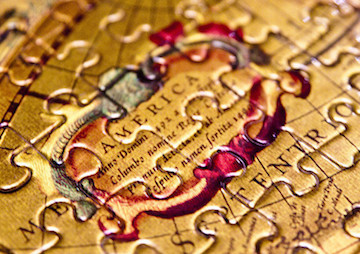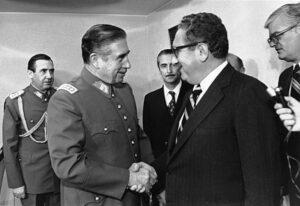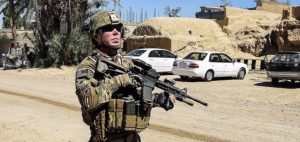Where Did the American Century Go?
If huge swaths of the world have begun to disintegrate in an era when minority insurgencies and terror outfits are the worst opponents the U.S. faces, consider what chaos could come to regions where a potentially hostile power remains. Ken Hawkins / CC-BY-2.0
1
2
3
Ken Hawkins / CC-BY-2.0
1
2
3
Who would have believed a movie or novel in which that same power, without national enemies of any significance in any of the regions where the fighting was taking place, would struggle unsuccessfully, year after year, to subdue scattered, lightly armed insurgents (aka “terrorists”) across a disintegrating region? Who could have imagined that every measure Washington took to assert its might only seemed to blow back (or blow somewhere, anyway)? Who would have believed that its full-scale invasion of one weak Middle Eastern country, its “mission accomplished” moment, would in the end prove a trip through “the gates of hell”? Who would have imagined that such an invasion could punch a hole in the oil heartlands of the region that, 13 years later, is still a bleeding wound, now seemingly beyond repair, or that it would set loose a principle of chaos and disintegration that seems to be spreading like a planetary Brexit?
And what if I told you that, after 15 years of such behavior, the only thing the leaders of that superpower can now imagine doing in the increasingly wrecked lands where they carry on their struggles is yet more of everything that hasn’t worked in all that time? Meanwhile — how improbable is this? — in its “homeland,” there is essentially no one, neither a movement in the streets, nor critical voices in the corridors of power protesting what’s happening or even exploring or suggesting other paths into the future.
Imagine that, wherever you looked, except in the borderlands of (and waters off) Russia and China, that single superpower was essentially unopposed and yet its ability to apply its unique status effectively in these years has been in eternal free-fall — even in perfectly peaceable areas to which it was closely allied. As an example, consider this: the president of that sole superpower flies to London and, in an England that (like much of Europe) hasn’t said no to Washington about anything of genuine significance in decades, strongly urges the British not to exit (or “Brexit”) the European Union (EU). He backs up his suggestion with a clearly stated threat. If they do so, he says, our closest trans-Atlantic partner will find itself at “the back of the queue” when it comes to future trade deals with Washington.
Remember, we’re talking about a country that has, in these years, seconded the U.S. endlessly. As David Sanger of the New York Times recently (and delicately) put it:
“No country shares Washington’s worldview quite the way Britain does, [American officials] say; it has long been the United States’ most willing security ally, most effective intelligence partner and greatest enthusiast of the free-trade mantras that have been a keystone of America’s internationalist approach. And few nations were as willing to put a thumb as firmly on the scales of European debates in ways that benefit the United States.”
By now, of course, we all know how the populace of our most loyal ally, the other side of that “special relationship,” reacted — with anger at the president’s intervention and with a vote to exit the European Union not long after. In its wake, fears are rising of further Frexits and Nexits that might crack the EU open and usher in a new era of nationalist feeling in Europe.
Failed World?
As goes Britain, so, it seems, goes the world. Give Washington real credit for much of this. Those post-9/11 dreams of global domination shared by the top leadership of the Bush administration proved wildly destructive and it’s gotten no better since. Consider the vast swath of the planet where the devastation is most obvious: the Greater Middle East and North Africa. Then ask yourself: Are we still in the American Century? And if not, whose (or what) century are we in?
If you had told me in 1975, when the Vietnam War finally ended some 34 years after Luce wrote that essay and 28 years before the U.S. invaded Iraq that, in 1979, Washington would become involved in a decade-long war in Afghanistan, I would have been stunned. If you had told me in 1975 that, in 2001, it would invade that same country and launch a second Afghan War, still underway 15 years later with no end in sight, I wouldn’t have believed you. A quarter-century of American wars and still counting in a country that, in 1975, most Americans might not have been able to locate on a map. If you had added that, starting in 1990, the U.S. would be involved in three successive wars in Iraq, the third of which is still ongoing, I might have been speechless. And that’s not to mention interventions of various sorts, also ongoing, in Somalia, Pakistan, Yemen, Libya, and Syria — none, by the way, by any normal standards successful.
If you were to do a little tabulation of the results of these years of American Century-ism across the Greater Middle East, you would discover a signature kind of chaos. In the early years of this century, officials of the Bush administration often referred to the region from China’s western border to northern Africa as an “arc of instability.” That phrase was meant to embody their explanation for letting the U.S. military loose there: to bring order and, of course, democracy to those lands. And with modest exceptions, it was indeed true that most of the Greater Middle East was then ruled by repressive, autocratic, or regressive regimes of various sorts. It was, however, still a reasonably orderly region. Now, it actually is an arc of instability filled with states that are collapsing left and right, cities and towns that are being leveled, and terror outfits, each worse than the last, that are spreading in the regional rubble. Religious and ethnic divisions of every sort are sharpening and conflicts within countries, or what’s left of them, are on the rise.
Dig, Root, GrowThis year, we’re all on shaky ground, and the need for independent journalism has never been greater. A new administration is openly attacking free press — and the stakes couldn’t be higher.
Your support is more than a donation. It helps us dig deeper into hidden truths, root out corruption and misinformation, and grow an informed, resilient community.
Independent journalism like Truthdig doesn't just report the news — it helps cultivate a better future.
Your tax-deductible gift powers fearless reporting and uncompromising analysis. Together, we can protect democracy and expose the stories that must be told.
This spring, stand with our journalists.
Dig. Root. Grow. Cultivate a better future.
Donate today.








You need to be a supporter to comment.
There are currently no responses to this article.
Be the first to respond.